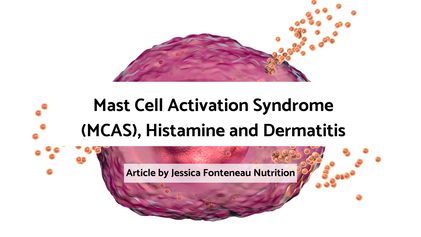ARTICLE Categories
All
|
|
Mast Cell Activation Syndrome (MCAS) is a complex condition that has been gaining attention in the medical community for its role in a variety of symptoms and diseases, including skin conditions such as eczema and dermatitis. (1–3) This article aims to shed light on what MCAS is, how it’s diagnosed, its connection to skin conditions and potential management strategies. What is MCAS? MCAS is a condition where mast cells, a type of white blood cell that play a crucial role in the body’s immune response, behave abnormally, triggering immune related symptoms. Mast cells play a pivotal role in the management of inflammatory responses, acting as the defensive guardians against pathogens. These cells are found in tissues throughout the body, especially where the body is exposed to contact with foreign bodies, such as the skin, lungs, and digestive tract. When mast cells detect a foreign substance or an injury they release a variety of different chemical signals including histamine, cytokines, and growth factors, which are all part of the body’s defence systems. This is normal and what keeps us healthy. Normally, mast cells help protect the body from disease and aid in wound healing but in MCAS these cells are overly sensitive and release too many of these chemicals leading to a range of symptoms that can affect every part of the body, including the skin, gastrointestinal, cardiovascular, respiratory and neurological systems. Long COVID is also thought to involve aspects of MCAS. Symptoms and Diagnosis The range of symptoms involved in MCAS are vast and can vary significantly from one individual to another. Reported symptoms include: flushing, itching, urticaria (hives), stomach pain, nausea, vomiting, diarrhoea, low blood pressure, headaches and breathing issues. The severity of symptoms can range from mild to life-threatening. As you can tell these are symptoms that can overlap with many other conditions making diagnosis tricky. Officially there are three sets of criteria needed for MCAS diagnosis:
The MCAS, Dermatitis Connection The skin is one of the organs most commonly affected by MCAS and dermatitis (atopic, contact and urticaria) is the most common skin illness linked to this condition. Dermatitis, characterised by inflammation of the skin, can be exacerbated by the overactive release of histamine and other chemicals from mast cells, leading to redness, itching, and swelling, all symptoms so characteristic of this chronic skin condition. The different types of eczema/dermatitis have multifactorial root causes including genetic, environmental and immune system factors. The link between MCAS and dermatitis is found within the immune system, particularly in how mast cells can over secrete the chemicals that can exacerbate an existing flare or trigger a new one. A combination of MCAS with chronic, relapsing dermatitis can cause misery for sufferers. Histamine, one of the most well-known mediators released by mast cells, is involved in immediate allergic reactions and plays a significant role in vasodilation or increased blood flow, and recruitment of other immune cells to the site of injury or infection. If you are interested in learning more about histamine, I have written a series of 5 articles relating to histamine, which can all be found via my website. Understanding the role of mast cells in immune responses and their contribution to conditions like MCAS and dermatitis underscores how intertwined both the immune system and skin health is. What is important to bear in mind is the need for support that may modulate mast cell activity but also alleviate the dermatitis symptoms. Management strategies for MCAS-Related Dermatitis Managing diagnosed MCAS and dermatitis needs a rounded approach that takes into account both the overactive mast cells and the dermatitis symptoms. Here are some tips that may help:
In summary, MCAS is a multifaceted condition that can significantly impact the physical and mental wellbeing of affected individuals. Having a medical diagnosis that then provides an appropriate treatment plan that alleviates symptoms is important, however, understanding the root cause of the hyper-activation be it food, environmental, lifestyle factors or stress is vital for long-term health. References.
Sign up for my news to receive the published articles straight to your inbox. Read more by clicking below to see my previously published articles:
I’m Jessica Fonteneau, the Eczema and Digestive Health Nutrition Expert. I’ve worked with hundreds of clients to help them change their diets, better manage their flares, and find relief. My vocation is to help those with eczema and digestive issues, because I have suffered with these interlinked conditions since I was 6 months old, and I truly know what it is like to experience these debilitating conditions. Every client I have ever worked with has their own triggers and ideal nutrition. There is no such thing as ‘one-size-fits-all’. Whether you work with me one-to-one or use my guided tools, my objective is to help you uncover what works best for you, so that you take back control and experience relief. My guided programmes are only suitable for adults as children have very specific nutrition requirements. I do, however, work with many child clients as part of my clinic. I also offer two free communities for adults caring for children with eczema and digestive symptoms, feel free to come and join us and get some well-deserved support.
To easily keep up with my articles, masterclasses, ebooks and online programmes and receive exclusive access to early bird offers, sign-up to my newsletter. Interested in what I do and who I am? Go to my website: www.jessicafonteneaunutrition.com
0 Comments
In my 10 years in clinic, specialising in skin health, I’ve seen first-hand the profound impact diet and lifestyle choices have on skin health. One area that is increasingly grabbing attention is the skin microbiome and its role in conditions like dermatitis/eczema.
In this article I’ll explore what the skin microbiome is, its connection to dermatitis and how paying it some attention can be a crucial step in managing this challenging condition. The skin microbiome: Our body’s first line of defence. You’ve probably heard of the gut microbiome, the population of microorganisms, including bacteria, fungi and viruses that live in our gut, but you may not have heard of the skin microbiome. The skin microbiome has a similar community of microorganisms that live on our skin and this complex ecosystem is vital in the protection of our skin from harmful pathogens, inflammation regulation and overall skin health. The skin microbiome is not only part of the skin barrier that stops unwelcome organisms from entering the blood stream, but it also acts as a crucial go-between from the outermost skin layer and the immune system. It is crucial that a balance of microorganisms be maintained to support the health of any organ that has a microbiome, including skin and gut. When an imbalance occurs in the skin microbiome, skin conditions such as eczema can emerge or worsen. Eczema and Microbiome Balance Eczema, also known as dermatitis, is characterised by dry, itchy, and inflamed skin. Research has shown that individuals with eczema often have an altered or unbalanced skin microbiome. (1,2). Eczema patients frequently have an increase in the Staphylococcus aureus bacteria which plays a role both in inflammation and possible infection. This imbalance can disrupt the skin’s barrier function, making it more susceptible to irritants and allergens, further worsening eczema symptoms. Nurturing the Skin Microbiome The good news is that we can nurture our skin microbiome, just as we can support our gut bacteria population. Here are some tips to get you started:
1. Barbarot S, Aubert H. Physiopathologie de la dermatite atopique. Ann Dermatol Venereol. 2017;144:S14–20. 2. Nakatsuji T, Gallo RL. The role of the skin microbiome in atopic dermatitis. Ann Allergy, Asthma Immunol [Internet]. 2019;122(3):263–9. Available from: https://doi.org/10.1016/j.anai.2018.12.003 Sign up for my news to receive the published articles straight to your inbox. Read more by clicking below to see my previously published articles:
I’m Jessica Fonteneau, the Eczema and Digestive Health Nutrition Expert. I’ve worked with hundreds of clients to help them change their diets, better manage their flares, and find relief. My vocation is to help those with eczema and digestive issues, because I have suffered with these interlinked conditions since I was 6 months old, and I truly know what it is like to experience these debilitating conditions. Every client I have ever worked with has their own triggers and ideal nutrition. There is no such thing as ‘one-size-fits-all’. Whether you work with me one-to-one or use my guided tools, my objective is to help you uncover what works best for you, so that you take back control and experience relief. My guided programmes are only suitable for adults as children have very specific nutrition requirements. I do, however, work with many child clients as part of my clinic. I also offer two free communities for adults caring for children with eczema and digestive symptoms, feel free to come and join us and get some well-deserved support.
To easily keep up with my articles, masterclasses, ebooks and online programmes and receive exclusive access to early bird offers, sign-up to my newsletter. Interested in what I do and who I am? Go to my website: www.jessicafonteneaunutrition.com |
AuthorI’m Jessica Fonteneau, I’m the eczema specialist and I help people Escape from the Eczema trap. Archives
April 2024
Catégories
All
|



 RSS Feed
RSS Feed